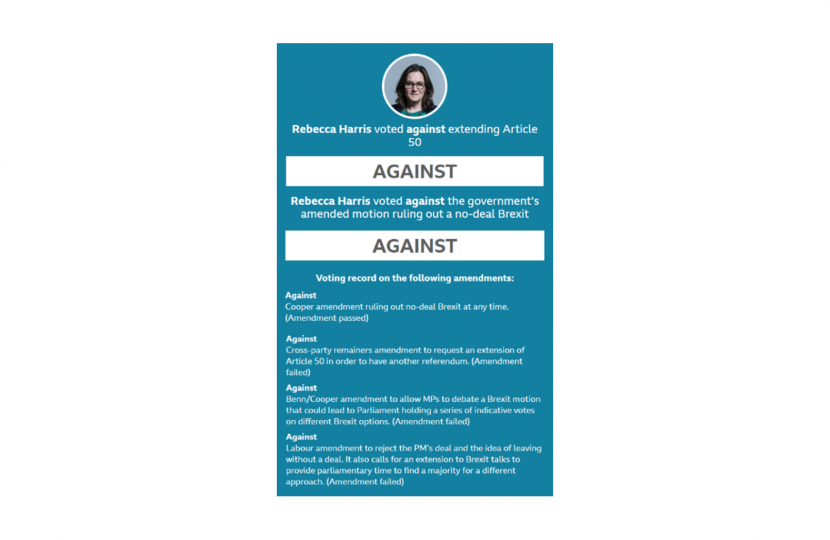
I have long held the view that we should leave the EU and campaigned for Vote Leave in the run-up to the Referendum. Our constituency had the third highest leave vote in the country and in 2017 I was elected on a manifesto commitment to honour the outcome of the Referendum. As such, I am clear that it is my duty as Castle Point’s MP to represent the explicit instruction given to me by my constituents in both the Referendum and General Election in Parliament. Following the Prime Minister’s announcement last week, there have been many votes in Parliament this week, and I want to clarify what I voted for and my reasons for doing so.
Why I voted for the Deal on Tuesday
In recent months, the Speaker of the House has overturned hundreds of years of precedent by allowing backbenchers to dictate Government business during Government time. This has allowed members of the House to try and frustrate our withdrawal process through numerous amendments that seek to soften the terms on which we leave the European Union. I have been very concerned that these amendments could prevent the UK from leaving the EU altogether, which in my view, would be a betrayal of democracy.
On Tuesday, I voted in favour of the Withdrawal Agreement because I felt that it was the best way to ensure that we do leave the EU and honour the result of the Referendum. Whilst I understand that the deal before Parliament was not perfect, I do not think a negotiated deal between twenty-seven states was likely to be. There were several positives to consider to the Withdrawal Agreement; it restored our sovereignty by ending the jurisdiction of the EJC, ended our membership of the Customs Union, and allowed Parliament to resume its full control of our immigration policy, laws, and regulations in the UK. Crucially, in two years’ time, we would have stopped paying millions of pounds to Brussels.
Why I voted for no deal on Wednesday
As the Withdrawal Agreement did not get a majority in the House of Commons on Tuesday, on Wednesday there was a vote on leaving the EU without a deal. I voted in favour of leaving the EU without a deal for the same reason that I voted for the Withdrawal Agreement; to ensure that our membership of the EU does end. I understand that there has been lots of scaremongering regarding the prospect of leaving the EU without a deal, however, I have been assured that each Governmental department is putting plans in place in preparation for leaving without a deal, such as; working to make sure that airplanes can continue to fly, that movements at the border remains as frictionless as possible, and that the NHS has the medicines it needs. Nonetheless, it is now clear, that there is a majority of MPs in the House of Commons who would not be prepared to leave without a deal, and have and will continue to vote to prevent it.
Why I voted against a second referendum
On Thursday, there was an amendment put forward by a member of the newly established Independent Group that called for a second referendum. I voted against this as I believe a second referendum would be a politician’s vote; telling people that they got it wrong the first time and should try again- which would damage public trust in our political system. I was surprised that despite the Labour Party coming out in support of a second referendum, the Parliamentary party was whipped to abstain from this vote. Furthermore, the People’s Vote campaign group, who have been lobbying for a second referendum, sent out a message to all their supporters telling them not to vote for this amendment. I am pleased that this amendment did not pass as only eighty-five MPs voted in favour of it.
Why I voted against an extension of Article 50 on Thursday
Following the House rejecting the prospect of leaving the EU without a deal on Wednesday, there was also a vote on a time-limited extension of Article 50 on Thursday. Whilst I understand the logic of seeking to gain permission from Parliament to extend Article 50 to have more time to pass the Withdrawal Agreement, personally, I did not support this. I voted against an extension because I understood that most of my constituents were not in favour of an extension, and neither was I. However, the motion was passed with a majority of 211 votes. This means that the Prime Minister must now attempt to negotiate a time-limited extension of Article 50. I should clarify that despite the House voting against a no deal Brexit and for an extension of Article 50, unless the EU agrees to such an extension, under UK and EU law if a Withdrawal Agreement is not reached by March 29th, we will leave the EU without a deal on that date.
